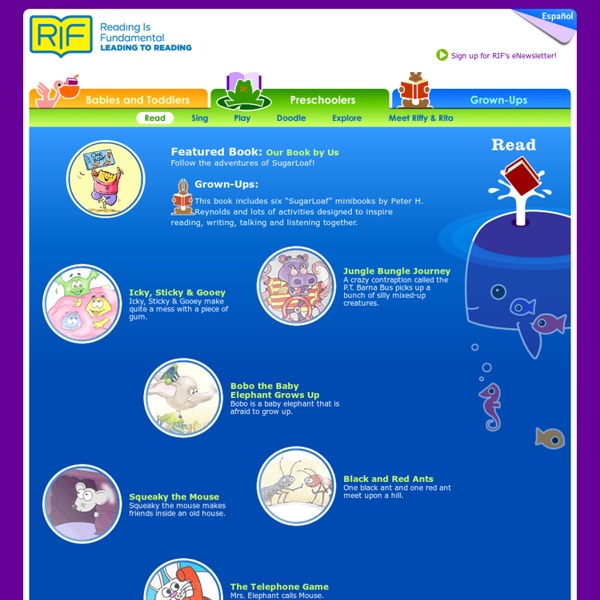



http://www.rif.org/kids/leadingtoreading/en/preschoolers/read.htm
children's short stories Peter was tired. After 10 years of holding together the paperwork for “Johnson, A.P. – SSN 555-66-33xx,” his tensile strength was fading; he could feel his molecules beginning to degrade. - Length: 8 pages Free eBook Library Welcome to our free eBooks collection, developed for children aged 3–11 years old. We are making even more eBooks available here, for the duration of UK school closures, so that your child has more to read. If you'd like to learn more about how to support your child's reading, visit our Reading pages.
We Give Books Read The Biggest and Brightest Light For Ages: 4-7 Read now More info Wishes Read now More info Free books: 100 legal sites to download literature The Classics Browse works by Mark Twain, Joseph Conrad and other famous authors here. Classic Bookshelf: This site has put classic novels online, from Charles Dickens to Charlotte Bronte.The Online Books Page: The University of Pennsylvania hosts this book search and database.Project Gutenberg: This famous site has over 27,000 free books online.Page by Page Books: Find books by Sir Arthur Conan Doyle and H.G.
6 Scaffolding Strategies to Use with Your Students What’s the opposite of scaffolding a lesson? Saying to students, “Read this nine-page science article, write a detailed essay on the topic it explores, and turn it in by Wednesday.” Yikes! No safety net, no parachute—they’re just left to their own devices. Epic! - Read Amazing Children's Books - Unlimited Library Including Flat Stanley, Scaredy Squirrel, Batman, and Many Others Epic! is the only kids' eBook subscription service that offers thousands of high-quality books from well known publishers like Harper Collins, National Geographic and many others. Learn More Massive Library
Digital Information Reading Strategies Anyone who has been to any of my presentations in the past couple of years knows that I’m passionate about teaching search skills. Not only search skills, but how search can and is truly changing our world. Search has the possibility to change our classrooms tomorrow because we can ask interesting questions that we never could ask before. If you are asking your students the same questions today that you asked before Google,it’s time to updated your questions. My Account Learn words with Rewordify.com. Live stats: update in 15 seconds Words currently being learned:
bernajean - Art of Digital Storytelling After a story is finished, it should be remembered for its soul, not the bells and whistles of technology. Bernajean Porter, DigiTales: The Art of Telling Digital Stories. Gather round the campfires as the ancient art of storytelling is being revived into an emerging communication mode called digital storytelling! Stories are as old as humans and more important than ever for our minds, spirits and human progress. Telling stories together about things that really matter has an extraordinary effect on people even more so when their digital storytelling is distributed quite literally to a world community through the World Wide Web.